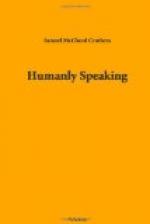“How am I to get things in their right perspective? When I left home I had a pretty clear and connected idea of history. There was a logical sequence. One period followed another. But in these walks in Rome the sequence is destroyed. History seems more like geology than like logic, and the strata have all been broken up by innumerable convulsions of nature. The Middle Ages were not eight or ten centuries ago; they are round the next block. A walk from the Quirinal to the Vatican takes you from the twentieth century to the twelfth. And one seems as much alive as the other. You may go from schools where you have the last word in modern education, to the Holy Stairs at the Lateran, where you will see the pilgrims mounting on their knees as if Luther and his protest had never happened. Or you can, in five minutes, walk from the Renaissance period to 400 B.C.
“When I was in the theological seminary I had a very clear idea of the difference between Pagan Rome and Christian Rome. When Constantine came, Christianity was established. It was a wonderful change and made everything different. But when you stroll across from the Arch of Titus to the Arch of Constantine you wonder what the difference was. The two things look so much alike. And in the Vatican that huge painting of the triumph of Constantine over Maxentius doesn’t throw much light on the subject. Suppose the pagan Maxentius had triumphed over Constantine, what difference would it have made in the picture?
“They say that seeing is believing, but here you see so many things that are different from what you have always believed. The Past doesn’t seem to be in the past, but in the present. There is an air of contemporaneousness about everything. Do you remember that story of Jules Verne about a voyage to the moon? When the voyagers got a certain distance from the earth they couldn’t any longer drop things out of the balloon. The articles they threw out didn’t fall down. There wasn’t any down; everything was round about. Everything they had cast out followed them. That’s the way Rome makes you feel about history. That which happened a thousand years ago is going on still. You can’t get rid of it. The Roman Republic is a live issue, and so is the Roman Empire, and so is the Papacy.
“The other day they found a ruined Arch of Marcus Aurelius in Tripoli, and began to restore it. New Italy is delighted at this confirmation of its claims to sovereignty in North Africa. The newspapers treat Marcus Aurelius as only a forerunner of Giolitti. By the way, I never heard of Giolitti till I came over here. But it seems that he is a very great man. But when ancient and modern history are mixed up it’s hard to do any clear thinking. And when you do get a clear thought you find out that it isn’t true. You know Dr. Johnson said something to the effect that that man is little to be envied whose patriotism would not gain force upon the plain of Marathon, or whose feelings would not grow warmer among the ruins of Rome. Marathon is a simple proposition. But when one is asked to warm his enthusiasm by means of the Roman monuments, he naturally asks, ‘Enthusiasm over what?’ Of course, I don’t mean to give up. I’m faint though pursuing. But I’m afraid that Rome is not a good place to rest in.”




